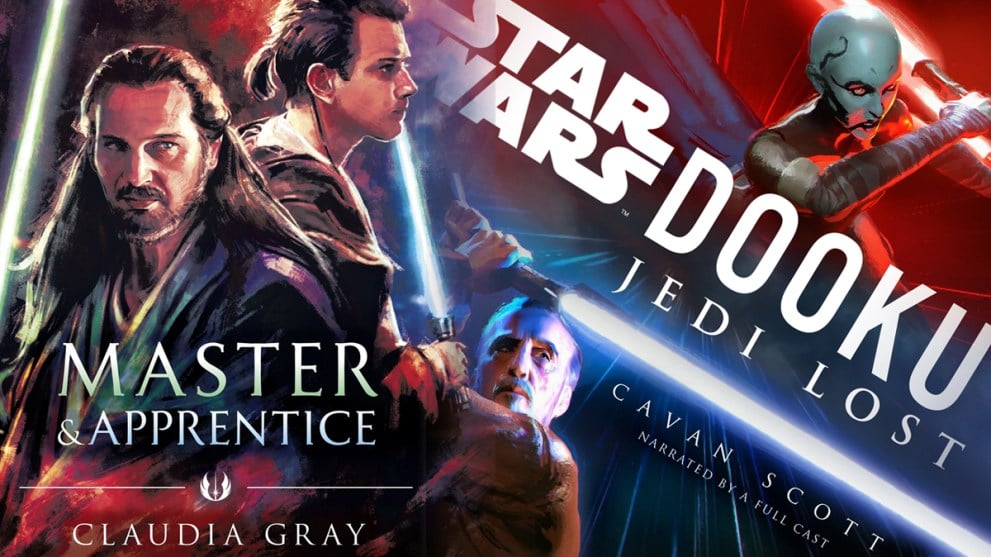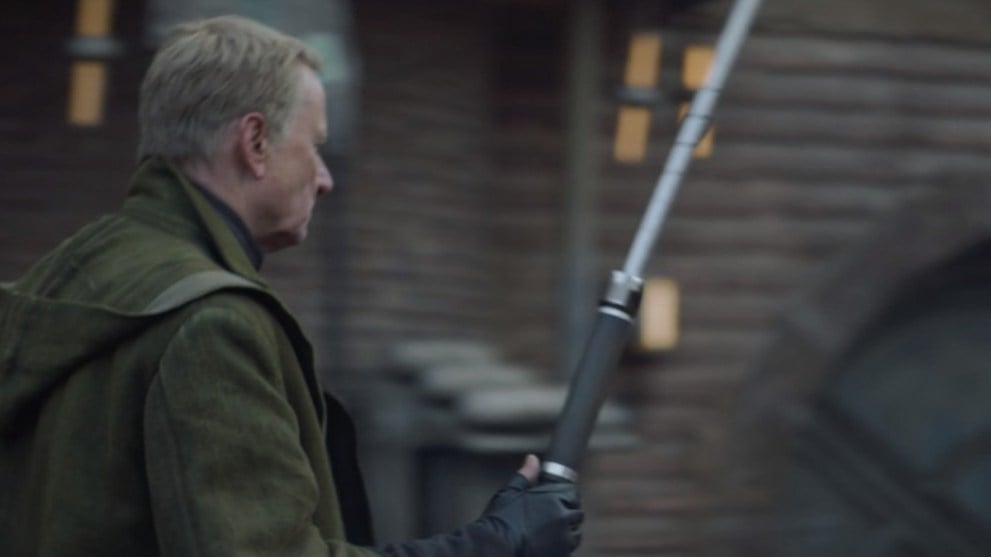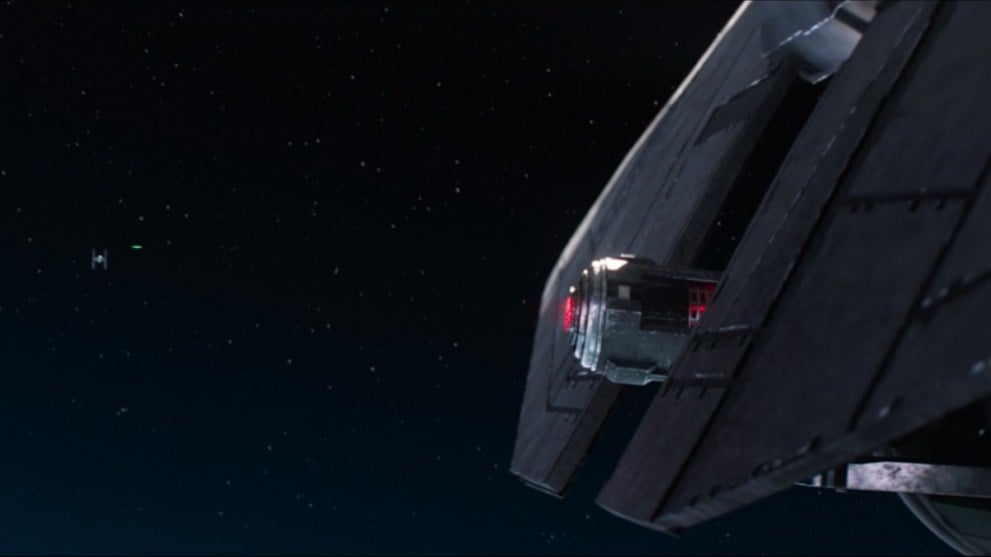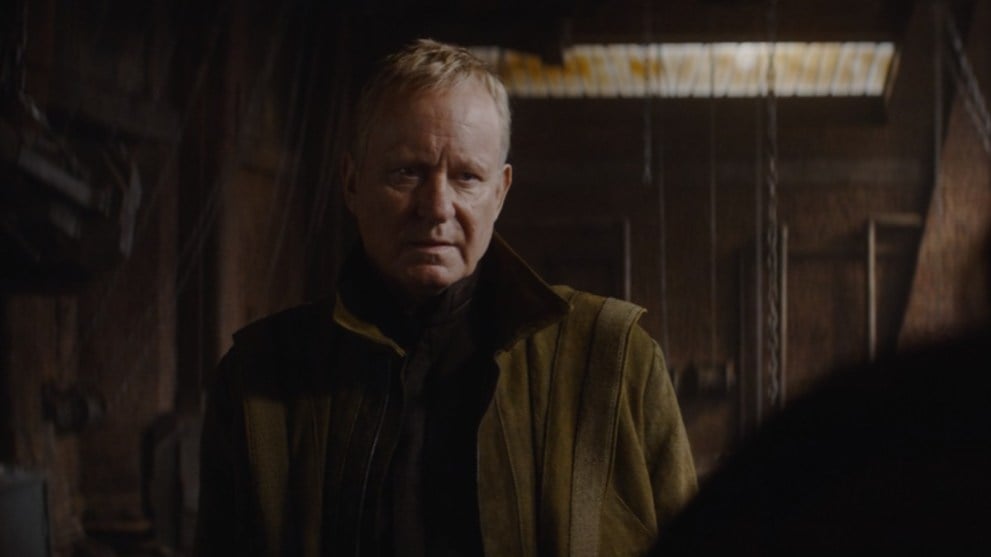Luthen Rael, played by Stellan Skarsgård, has a hazy background, and his history is relatively unknown in the Andor series. We do know a few things: he is rebellious and a master of hiding in plain sight. While it is apparent showrunner Tony Gilroy is giving us a much more grounded story similar to Rogue One that is devoid of the mystical Force and its wielders, the Jedi, this theory, when explained, could be both mind-blowing and plausible when it comes to Luthen, so let’s explore the question, is Luthen a former Jedi in Andor?
What’s in a Name?

This theory posits that, yes, Luthen is indeed a former Jedi, and the theory’s foundations begin with his name; more precisely, his surname, Rael. Now, names can repeat, and it does not always mean it is the same person or even a relation. However, this is transposing the first name to the last name. In Claudia Gray’s Master and Apprentice and Caven Scott’s Dooku: Jedi Lost, we are introduced to a bizarre Jedi named Rael Averross. This theory will explore how his strangeness also adds to the plausibility later; what is essential now is Averross is a human male of an age, which, when the math is applied, would make him around the same age as Luthen in Andor’s time period.
So, examining the basics, we check some boxes. Both previously mentioned books were published in 2019, so they are canon which makes Averross canon. Averross and Luthen are human males and would be about the same age in 5BBY when Andor takes place. If Averross and Luthen are one and the same, Averross would obviously be hiding that he was once a Jedi in this Empire-controlled time period. Averross, because of his distance from the Temple and the Order, which is explored in the next section, would be a Jedi not readily known in the galaxy, nor would his name. Keeping some familiarity with his old life, using his first name as his new identity’s last name makes sense. This alone would be a weak connection to make this theory solid, but once we take a closer look at Rael Averross, some other dots start to connect.
Who Is Rael Averross?

Averross was inducted into the Jedi Order at the age of five after demonstrating Force sensitivity. He completed his training in the ways of the Force as a Padawan under Jedi Master Dooku, but he struggled to follow the Jedi Code. He was deemed controversial by Supreme Chancellor Kaj, and even his friend Qui-Gon thought he was extremely reckless and arrogant.
Before the invasion of Naboo, Averross had an apprentice, a Tholothian named Nim Pianna. While on a mission, Pianna was struck with a slicer dart containing nanotechnology that took control of her brain functions, forcing her to attack Averross. Reluctantly, he was forced to strike his apprentice down, ending her life. Despite blaming himself, the Jedi High Council exonerated Averross of any wrongdoing. However, his presence became a distraction to the Council, prompting them to send him on a long-term mission to the distant planet of Pijal to keep him away from the Jedi Temple.
The throne of Pijal had been inherited by the six-year-old Crown Princess Fanry, who could not assume her authority until she reached the age of fourteen. Because of infighting within the Pijali court, none of their candidates were deemed suitable to be the Regent. As a result, it was agreed that a Jedi would be sent to fill that role until the princess reached the age of maturity; this Jedi was Averross.
Averross struggled with guilt over having to strike down his apprentice; that guilt, coupled with his isolation and distance from other Jedi and the Temple, caused him to stray from some fundamental Jedi tenants. He was apprenticed to Dooku while a padawan, inheriting much of his former Master’s rebelliousness into his personality and ideology. He was more open-minded about the Jedi Code, going so far as having a casual sexual relationship with the local innkeeper, Selbie, and unlike most Jedi, Averross was unconcerned about his image, even consuming death sticks on Takodana.
The last time we hear of Averross, he remained on Pijal to look over Fanry, and as far as it is known, he never returns to the Jedi Temple or participates in the Clone Wars. In one of the last moments with Averross, he catches up with Dooku, who appears to try and tempt him to the Dark Side by offering a vague “great power,” which he rebuffs, saying he had chosen the light and was not interested in what Dooku had to offer him. There is a lot to unpack with his traits, personality, and even his connection to Fanry, which will play into why he and Luthen could be the same person.
The Luthen -Rael- Averross Connections

Any time a fan watches new Star Wars content in this Disney era, it has become a habit to look for small clues and speculate on possible Jedi/Sith connections from other media. Andor has had easter eggs from even the Expanded Universe, like Starkiller’s armor from the Force Unleashed games. In the Kenobi series, they dropped a former Jedi name from the Clone Wars, Quinlan Vos.
Luthen, while remaining an enigma, has given many clues to Jedi connections. One of the first is when Luthen gives Cassian a necklace containing a blue kyber crystal as a down payment and a symbol of trust. Luthen values the blue kyber crystal and wishes it returned once the job is completed. Luthen goes on to say that the kyber “celebrates the Rakatan invaders’ uprising,” an ancient race of Dark Side users who battled the early Jedi (then called Je’daii) on Tython, a planet shown in the Mandalorian. Why would Luthen have a kyber crystal of all things and it also be something he values highly?
Well, Averross wielded a blue lightsaber that could instantly tie Luthen’s necklace to Averross, it could be his old kyber crystal from his days as a Jedi, hiding it in plain sight. In Episode 11 of Andor, we also see Luthen carrying a collapsable walking stick that looks much like a lightsaber hilt. A recent leak of the Luthen Black Series figure shows that this walking stick also hides a dagger. In one scene while walking, the way he holds it and the way it collapses is eerily reminiscent of a Jedi powering down their saber. Suppose Luthen did indeed dismantle his lightsaber and remove the crystal. In that case, he could have very well modified the hilt to hide a dagger, again keeping it for sentimental reasons but hiding in plain sight, much like he is as a leader in the rebel cause.
The next connecting tissue is Luthen’s close relationship and kinship with his “assistant” in his antique shop and fellow rebel conspirator, Kleya. Kleya seems to be a force to be reckoned with, and the only person who can push back on Luthen would be someone he has known for a very long time and trusts implicitly. Her age is extremely close to the same age Princess Fanry would be. We do not know what happens to Averross or Fanry after 48BBY. Still, a plausible argument could be made that Pijal was put under Imperial control after the fall of the Republic, forcing Fanry and Averross to flee. The occupation of Pijal could have set them both on their course to be the Rebel leaders they are in Andor, especially considering his former Master Dooku became a Sith and aided the fall of the Jedi Order.

By the time we get to Episode 11 and see the power of Luthen’s ship, the Fondor, more connections can be made to Averross. A small link to how Luthen highly modified his ship is that Averross also worked with the droid Aitch-Sixteen on his starfighter’s laser capacitors. While that is a nice little tidbit, what is more telling is Luthen’s calm and precise command flying the ship while accurately targetting the laser turrets, something we’ve frequently seen with force-sensitive pilots in Star Wars.
Adding to this, the Fondor is apparently powered, or at the very least the weapon systems, by what looks like a red kyber crystal. Twin red laser beams shoot out of the side of the Fondor from a device that looks like a large lightsaber hilt, and Luthen proceeds to spin the Fondor, slicing TIE fighters out of the sky, akin to an Inquisitor’s dual-bladed spinning sabers. The fact they are red plays an essential part in Luthen’s current state of mind and ideology, which is explored in the next section.
The Ideology of Luthen Rael

A Jedi when we last saw him, he remained with the light, skirted with the dark side that stemmed from his guilt of killing his apprentice. As explained in this theory, Averross was an unconventional Jedi who had a strong sense of his purpose, which was protecting Fanry and fighting the hegemony of the Czerka Corporation in those stories. With a possible occupation of Pijal and him and Fanry/Kleya having to flee, transforming himself into “Luthen” is a very plausible scenario. Fanry’s connections with the Republic and people within could have helped Luthen forge this high society antique seller facade.
The Luthen we see in Andor is a man who has lost faith in doing things peacefully and ethically. A man who lost his former Master to the Dark Side and his good friend Qui-Gon in the conflict. Skarsgård’s epic speech in Episode 10 sounds like a defeated Jedi with only one alternative. When Lonni asks what he has sacrificed, he responds:
“Calm. Kindness. Kinship. Love. I’ve given up all chance of inner peace. I’ve made my mind a sunless place. I share my dreams with ghosts. I wake up every day to an equation I wrote 15 years ago from which there is only one conclusion, I am damned for what I do. My anger, my ego, my unwillingness to yield, my eagerness to fight, they’ve set me on a path from which there is no escape. I yearn to be a savior against injustice without contemplating the cost and by the time I looked down there was no longer any ground beneath my feet. What is my sacrifice? I’m condemned to use the tools of my enemy to defeat them. I burn my decency for someone else’s future. I burn my life to make a sunrise that I know I’ll never see. So what do I sacrifice? Everything!”
When Averross is deconstructed, this emotionally charged response sounds eerily like a path that a personality like his could go down when all hope in what he once knew is lost. The ghosts he shares those dreams with could be his former friends and fellow Jedi. Using the tools of his enemies? Like red kyber crystals of Dark Side users that he puts on display in the Fondor. His ego? Like Averross’s arrogance, as described by Qui-Gon. A former Jedi, fleeting with the emotions and tools that lead to the Dark Side, is emblematic of someone who would burn their decency for someone else’s future.
He also states he began this fight fifteen years ago, which means he started it with the fall of the Republic and Order 66. Could a non-Jedi be this angry about the rise of the Empire when most normal citizens, who knew nothing about Order 66, didn’t realize the danger of the Empire until years later? Only a Jedi who knew what happened to the Order, his friends, would carry this much anger immediately after the Empire came to power. The fact he knows ancient Force lore, such as the Rakatan invasion and the Je’daii on Tython, a planet shown in the Mandalorian as a barely known secret, makes him far more knowledgeable than anyone who was not a part of the Order.
It seems weird Luthen would have all this knowledge and not be a Jedi or at least a force sensitive. As far as Luthen not showing capability or the Force, Luke showed one could shut their connection to the Force off, and someone as dedicated to hiding who he is, especially if he was a Jedi, Luthen/Averross would not touch the Force knowing it could reveal what he is.
This is a theory, and it could be spectacularly wrong, or at the very least, Luthen could have had connections with Jedis in the past and isn’t one himself. The connection with kyber could be a nod to what we know happens in Rogue One, seeing Jyn Urso has a similar necklace given to her by her father, who engineered the Death Star using kyber crystals. However, there is a solid case for the theory; in this humble fan’s opinion, this could be the path it goes down.
